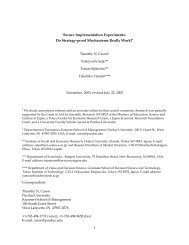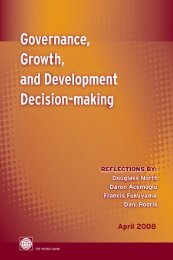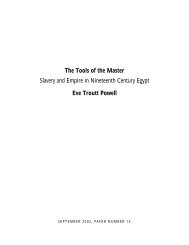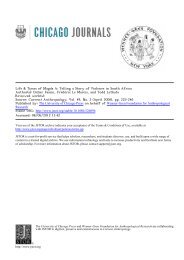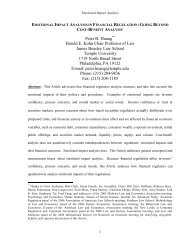Compassion and Repression: The Moral Economy of Immigration ...
Compassion and Repression: The Moral Economy of Immigration ...
Compassion and Repression: The Moral Economy of Immigration ...
Create successful ePaper yourself
Turn your PDF publications into a flip-book with our unique Google optimized e-Paper software.
IMMIGRATION POLICIES IN FRANCE 365<br />
Figure 2<br />
Tents in the center <strong>of</strong> Sangatte. Artist: Jacqueline Salmon 2001.<br />
made temporary homes in a blockhouse left by the Germans on the beach at the<br />
end <strong>of</strong> World War II. <strong>The</strong> police were accused <strong>of</strong> setting one <strong>of</strong> the shelters on fire<br />
with gasoline (Le Monde 2002c). Local <strong>and</strong> national NGOs called for humanitarian<br />
management <strong>of</strong> the cases. As an increasing number <strong>of</strong> immigrants gathered in a<br />
church hall, the government decided against the use <strong>of</strong> force, <strong>and</strong> the new préfet<br />
announced that a place would be opened to accommodate them. A year later, the<br />
Sangatte warehouse had been destroyed, <strong>and</strong> the media were no longer interested<br />
in Calais; yet immigrants were still trying to get to Britain. While waiting for an<br />
opportunity to cross the channel by boat or by train, they w<strong>and</strong>ered through the<br />
streets <strong>and</strong> slept in the parks <strong>of</strong> the city.<br />
<strong>The</strong> drama <strong>of</strong> Sangatte is paradigmatic <strong>of</strong> tensions between the discourses <strong>and</strong><br />
practices <strong>of</strong> compassion <strong>and</strong> repression in the policies <strong>of</strong> immigration <strong>and</strong> more<br />
specifically <strong>of</strong> asylum in Europe (Bloch <strong>and</strong> Schuster 2002). In a wider perspective,<br />
it <strong>of</strong>fers a basis for underst<strong>and</strong>ing the moral economy <strong>of</strong> contemporary Europe.<br />
In his historical study <strong>of</strong> the British poor, E. P. Thompson (1971:79) referred to<br />
“moral economy” as a “traditional view <strong>of</strong> social norms <strong>and</strong> obligations, <strong>of</strong> the<br />
proper economic functions <strong>of</strong> several parties in the community,” which “impinged<br />
very generally on eighteenth-century government.” In his ethnographic research<br />
on Southeast Asian peasants, James Scott (1976:3) similarly defined “moral economy”<br />
as a “notion <strong>of</strong> economic justice <strong>and</strong> [a] working definition <strong>of</strong> exploitation,”<br />
which permitted us “to move toward a fuller appreciation <strong>of</strong> the normative roots <strong>of</strong><br />
peasant politics.” Both give a specific economic meaning to the concept, but in their<br />
utilization, they obviously open it to a broader sense: the economy <strong>of</strong> the moral values<br />
<strong>and</strong> norms <strong>of</strong> a given group in a given moment. I will retain this meaning here in<br />
the analysis <strong>of</strong> the values <strong>and</strong> norms by which immigration <strong>and</strong> asylum are thought<br />
<strong>and</strong> acted on <strong>and</strong>, in a broader sense, which define our moral world (Fassin 2005).



